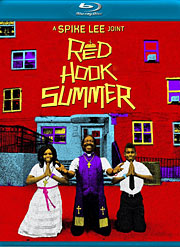- Rated R
- Drama
- 2012
- Buy the BD
All photos © Variance Films
Reviewed by Ezra Stead
illed as the latest film in Spike Lee's Chronicles of Brooklyn series (which also includes the far superior “She's Gotta Have It,” “Do the Right Thing,” “Crooklyn,” “Clockers” and “He Got Game”), “Red Hook Summer” rivals “She Hate Me” for the title of Lee's weakest joint to date. Though it takes a surprisingly intense turn in its third act and suddenly gets very engaging and insightful for a while, it takes so long to get to that point, and the journey is so tedious and feels so forced, that the film can't be recommended to anyone but diehard Lee fans. I've actually always considered myself to be just that, but even I couldn't really get into this immensely frustrating film.
Of all his aforementioned films, this one bears the most resemblance to “Crooklyn” in that the story is told primarily through the eyes of its child characters. Silas “Flik” Royale (Jules Brown) is a smart, stubborn 12-year-old from Atlanta who is brought to the Red Hook neighborhood of Brooklyn by his mother, Colleen (De'Adre Aziza), to stay for the summer with his deeply religious grandfather, Bishop Enoch Rouse (Clarke Peters). Enoch is the head of a small local church called Little Piece of Heaven, and in order to instill a sense of discipline in his grandson, he quickly puts Flik to work for the church, making him hand out flyers and help out with the church's maintenance under the supervision of Deacon Zee (Thomas Jefferson Byrd).
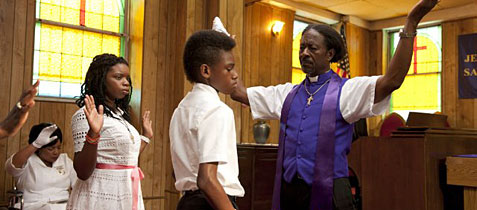
While sneaking some snacks from the church pantry, Flik meets Chazz Morningstar (Toni Lysaith), a pretty girl about his age from the neighborhood, and they begin a teasing, middle school courtship that involves colorful insults and Flik chasing Chazz with a dead rat. Chazz's mother, Sharon (Heather Alicia Simms), is a good friend and possibly even romantic interest of Enoch's, and Flik's friendship with Chazz is one of the few things that makes him change his mind about how much he hates living with his grandfather in Red Hook. In a way, these two relationships parallel one another, with Chazz and Sharon each bringing Flik and Enoch out of their isolation, and at times it is almost like the four of them are a family.
Meanwhile, Flik runs afoul of a local gang of drug dealers and petty criminals led by Box (Nate Parker), who has some objection to Flik filming him on his iPad, at least under any circumstances over which Box does not have complete creative control. When Enoch manages to get the stolen iPad back from Box and save Flik from potentially coming to harm, Flik really begins to appreciate his grandfather more, only to have his perception unexpectedly shift again in the film's third act. This third act, involving a figure from Enoch's past named Blessing Rowe (Colman Domingo), really grabs the viewer by the throat after nearly lulling us to sleep, and it leads to a sensitive and unusual exploration of a very difficult subject. However, it ultimately feels like a case of too little, too late, and something of a waste of an electrifying performance by Domingo.
In between all of these plot points is endless sermonizing, and not just in the scenes in which Enoch speaks before his congregation. There is plenty of that, to be sure, and though Clarke Peters' performance as “Da Good Bishop” is strong and convincing, these scenes are nearly unbearable to anyone who has ever found church services incredibly boring. Compounding the tedium is the fact that a lot of the scenes in between feel like heavy-handed sermons written by Lee himself, in which characters seem to be preaching to the audience more than exchanging dialogue with one another. Lee's self-parodying cameo as “Mr. Mookie,” reprising his character from “Do the Right Thing” as a man in his fifties still delivering pizza on foot, is more embarrassing than endearing, and sets an unfortunate tone for the rest of the film. The distinctive style is still there, and Lee should be commended for tackling yet another sensitive subject in an insightful way, but this is a far cry from his best work.
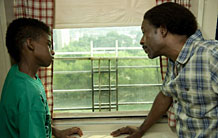 |
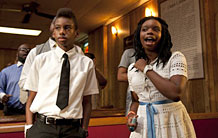 |
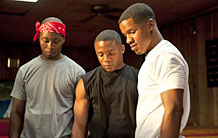 |
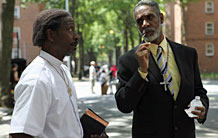 |
You can follow us on Twitter and Facebook for content updates. Also, sign up for our email list for weekly updates and check us out on Google+ as well.












